

Transcription
TRULINCS 23038076 - LUMMUS, ALLAN CRAIG - Unit: BAS-T-A
From: 23038076
To: Cif Prison Ministry, The
Subject: mp80 The Problem of Instinct and Addiction
Date: 12/29/2014 03:25:35 PM
mp80 The Problem of Instinct and Addiction
I look at all the very talented people that are already doing such great work in mindfulness. I can feel it deep within when I think about my future. "What am I trying to pass myself off as... a Guru or something." The negative talk. Talk of failure, rejection. It is so second nature now. It is my first response, my gut response.
My habit patterns make me question all the "wisdom" about following one's gut. My instincts have been conditioned over the decades to protect self at all costs. Pull me into the shadows where the light will not reveal all my flaws. Leaving me open for criticism. Hide so I will not be hurt.
No, I have to consciously choose to act in ways contrary to my conditioned instinctual response. A new response, choosing the risky path. A path that risks failure but offers authentic rewards—a self that is whole and self-sustaining. A self that can heal itself, sustain itself through failure and loss, and still be whole and healthy. Yes, hurt and loss will happen, but they cannot be eliminated.
Yes, it is risky as a Registered Sex Offender (SO) to try anything that brings attention to themselves. Many will choose to not associate with me because of my status as a SO. But just like I personally do not need to have everyone as my friend, an organization does not need the entire community to support it. My mindfulness center will only need enough to keep time, money, and space to keep it open.
Thich Nhat Hanh uses a nice image from Buddhist psychology of our consciousness as a garden with seeds of every possible emotion, feeling and state. Every act waters some and ignores others. The present state of our garden of consciousness has some seeds that are big plants and others that are withered and almost... almost dead. It is a picture of our past actions and influences on how we act in the present. As an addict, I have watered some unhealthy behaviors and mind states like anger, fear, greed, aggression. I have neglected some healthy behaviors and mind states like kindness, empathetic joy, compassion, equanimity.
My habit energy saved in my garden means that if I let the water fall undirected, it will fall on the big unhealthy plants more than my small healthy seeds. So I have to consciously choose to water healthy seeds and neglect the unhealthy to change my habit energy into a more positive direction. I like the image because it fits with my experiences. It takes into account my past and shows that what I do now matters too. I can water my kindness and compassion today. I can starve my fear and greed today. Tomorrow, do the same. The next day, do the same. Then eventually my garden will change. Slowly, yes, but really change. Change by day to day action, not through wishing and hoping.
This is not some Pollyanna, "Oh, just go with the flow. My gut will tell you what to do. Don't think or use discernment. Just act." Well, that may be good for those who have already reached enlightenment. It is surely not my reality. My habit energies still cause me to choose actions that cause me suffering. I still freeze with flooded intense emotions. I still run and hide emotionally to protect me from being overwhelmed. I have much to learn about "living life with a heart wide open", as one of my favorite mindfulness books is called.
Pema Chodorn uses the images of training a dog to stay (sit) as a model for us in our lives. In meditation, we learn to sit with or stay with what arises. I am learning how to stay with my feelings of self-hatred, fear, anger, pride. I am doing better while sitting on my cushion. Now I need to translate that skill of stay into my life in time and peace, not just in meditation.
DAP (Drug and Alcohol Treatment Program) will help me to see how I am progressing. The staff like to poke and prod all the participants' emotional buttons and see how they react. I will have plenty of opportunities to not respond habitually (defensively) and choose a response that is self-reflexive and compassionate (to myself and others).
Allan Lummus #23038076 | PO Box 1010 bastrop, tx 78602 | mindful prisoner | betweenthebars.org

Other posts by this author
|
2017 sep 12
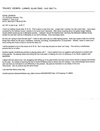
|
2017 may 31
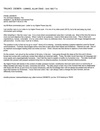
|
2017 feb 23
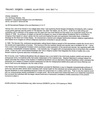
|
2017 jan 15
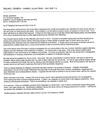
|
2016 dec 11
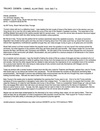
|
2016 nov 26
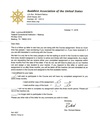
|
More... |
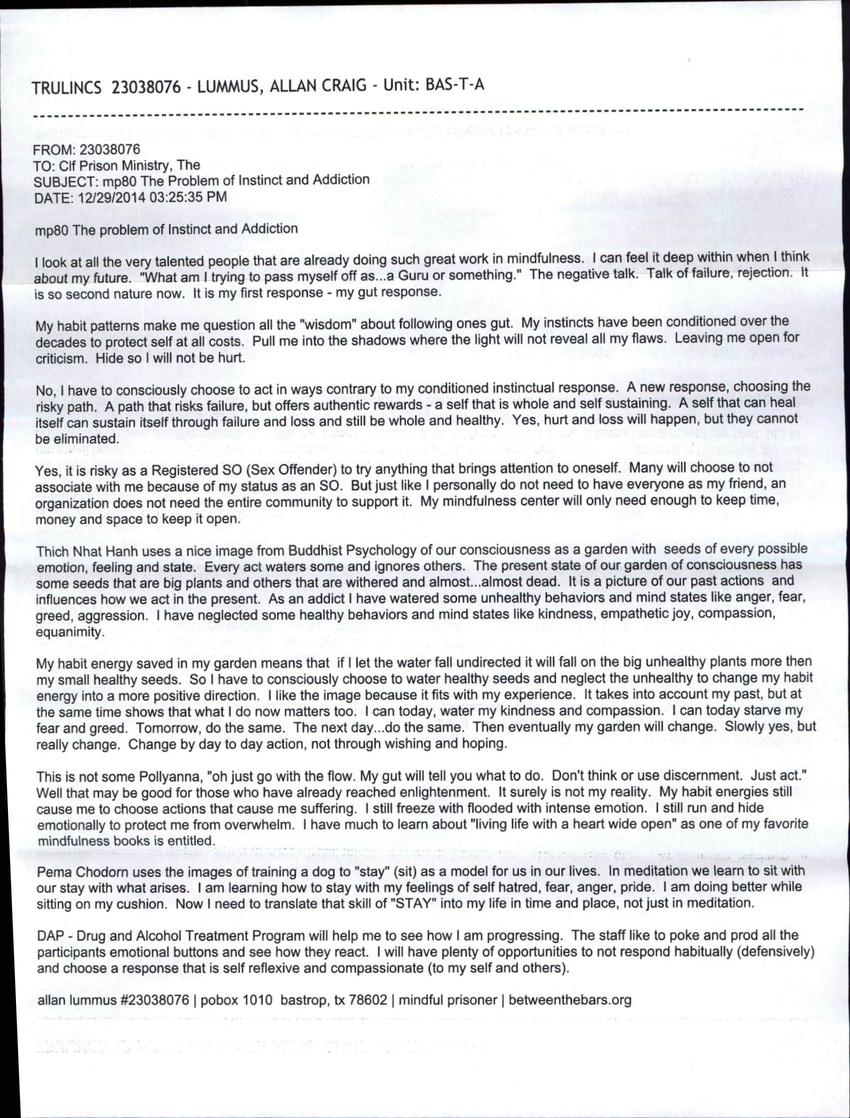

Replies (1)
Thank you for sharing.
Respectfully,
Anne K